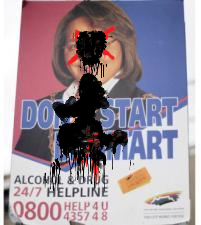The Tobacco Products Control Act of 1993 (ActsOnline) is a poorly drafted piece of legislation with some curious unintended consequences. Pick 'n Pay is a tobacco retailer, as is each and every retailer in the country - from Makro, to Shoprite to every corner shop. Retailers are banned from doing ANYTHING at all. Sound exaggerated? The actual wording of the section dealing with the restriction on tobacco retailers reads:
s3. Advertising, sponsorship,
promotion, distribution, display and information required in respect of
packaging and labelling of tobacco products
ss1) Contains a total ban on all forms of direct and indirect tobacco advertising.
ss2) No manufacturer, importer, distributor or retailer of tobacco products (Read Pick 'n Pay) shall-
a) organise or promote any organised activity that is to take place in whole or in part in the Republic;
b) make
any financial contribution to any organised activity that is to take
place, or is taking place, or has taken place in whole or in part in the
Republic;
c) make any financial contribution to any person in respect of-
i) the organisation or promotion of any organised activity in the Republic by that person;
ii) the
participation, by that person, in any organised activity that is to
take place, or is taking place in whole or in part, in the Republic.
ss3) A
manufacturer or importer of a tobacco product may make a charitable
financial contribution or sponsorship, provided that such contribution
or sponsorship is not for the purpose of advertisement.
ss5) Notwithstanding the provisions of subsections (1), (2) and (3), the Minister may prescribe exemptions for unintended consequences or the phasing out of existing sponsorship or contractual obligations.
ss11)This
section must not be construed as limiting, amending, repealing or
otherwise altering any legal obligation or liability in terms of any
other law to warn consumers of the risks of using a tobacco product
which a manufacturer, importer or retailer is bound by.
 The restrictions placed on manufacturer, importers, distributors extended to retailers of tobacco products.The restricted parties are restricted from organising ANY ORGANISED ACTIVITY anywhere in the country. The restrictions furthermore include making any financial contribution to any organised activity within the country. Pick 'n Pay's sponsorship of SHAWCO and Sax Appeal is technically illegal. Further compounding the problem is that ss3 makes provision for manufacturers or importers of tobacco products to make charitable contributions. If the legislators wanted to exempt retailers they would have done it here, but they didn't. To have such a broad ban on doing anything at all is hard to understand and would appear to be unconstitutional. It would seem ridiculous that the tobacco law could override freedom of association required for an event such as the Cape Argus Pick 'n Pay cycle tour or the corner cafe sponsoring a soccer team with kit to wear.
The restrictions placed on manufacturer, importers, distributors extended to retailers of tobacco products.The restricted parties are restricted from organising ANY ORGANISED ACTIVITY anywhere in the country. The restrictions furthermore include making any financial contribution to any organised activity within the country. Pick 'n Pay's sponsorship of SHAWCO and Sax Appeal is technically illegal. Further compounding the problem is that ss3 makes provision for manufacturers or importers of tobacco products to make charitable contributions. If the legislators wanted to exempt retailers they would have done it here, but they didn't. To have such a broad ban on doing anything at all is hard to understand and would appear to be unconstitutional. It would seem ridiculous that the tobacco law could override freedom of association required for an event such as the Cape Argus Pick 'n Pay cycle tour or the corner cafe sponsoring a soccer team with kit to wear.
The Minister may prescribe exemptions "for unintended consequences" in terms of ss5). Sections allowing the minister to fix the unintended consequences of legislation are extremely unusual as it essentially transfers the legislative power to a single minister. That is what the law says. Of course there will be a million excuses and umming and ahhing, but if you read the law, that is what it says.
























































